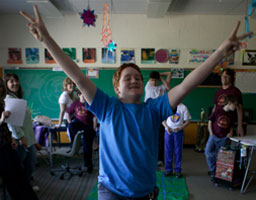
Executive Functioning in Older Children
Underdeveloped executive functioning in older children is characterized by impulsivity, inability to control emotions, and not considering the consequences of one’s actions.

Profectum Foundation
- Apr 18
- Executive Function
- Featured
Older children tend to act on emotion rather than thoughtful decision making. This is because the part of the brain responsible for decision-making (frontal lobe) is not fully developed until an individual reaches the age of 25. Issues with executive functioning in older children could lead to further difficulties later in life — such as engaging in risky behavior, mood disorders, and poor academic performance. In order to minimize the possibility of these problems occurring, older children must practice executive function skills. Teens with executive function disorder will not learn these skills instinctively. Therefore, it is important to provide older children with many opportunities and meaningful experiences that require the use of executive functions. An example would be in planning a social outing. A parent or caregiver could support the initiation of the experience, planning of steps, predicting of emotions involved, troubleshooting problems, questioning what worked and what didn’t the last time, and monitoring progress..
As a young child, parents and caregivers can play the role of the frontal lobe by making thoughtful decisions for the child. As children get older, however, the eventual goal is for them to be able to make sound decisions independently. Asking the right questions to activate executive functions in a child's brain can be very helpful as part of building towards independence. Asking "What do you think the next step might be?” versus telling them the next step is a way to trigger the needed executive function.
Addressing Deficits in Executive Functioning in Older Children
One of the keys to addressing issues with executive functioning in older children is to help them acknowledge their strengths, challenges, and what needs to be done to fulfill their needs. Otherwise, older children may never come to terms with their differences, which could lead to frustration and a lack of self-esteem needed to be successful in life. At worst, they could become depressed and develop negative habits that are hard to break. When an older child with executive function deficits is able to understand their needs and acknowledge their strengths, they may even exceed their peers in certain areas. For example, they may begin to take more initiative, become more organized, and more goal-oriented.
In addition to helping older children understand their strengths and limitations, it’s also important to help them find what they’re passionate about. It’s not unusual for individuals with executive function deficits to develop interests that are out of the norm, and parents should maintain an open mind. With that said, it may take more time for older children with executive function deficits to discover a passion that translates into a successful job or career. So it’s important that neither parents or children become discouraged along the way. At the very least, encouraging a child to nurture their passions may prevent them from otherwise engaging in risky behavior. Further, nurturing a passion could lead to developing skills which will improve the child’s self-esteem and self-confidence.

More on Featured



